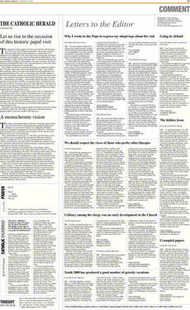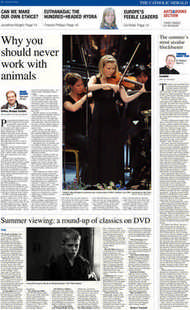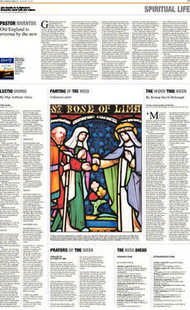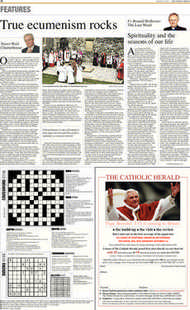Page 15, 27th August 2010
Page 15

Report an error
Noticed an error on this page?If you've noticed an error in this article please click here to report it.
Tags
Share
Related articles
‘catholicism Is A Rational Philosophy’
Aquinas Dinner Held In Ealing
Agony Of Faith
The New Challenge For Western Liberal Democracy
When Cosy Ideas About God Are Put Under Siege
A Vision Of Faith 'without The Pixie Dust'
Ideas that would make Calvin spin in his grave
Jonathan Wright enjoys a professor’s crowd-dividing reflections on religious belief
BY JOHN COTTINGHAM CONTINUUM, £14.99
henever we talk about ethical certainties we are obliged to confront two conundrums.
First, what are the unchanging moral standards in question? If you and I sat down together to define the component parts of “good” behaviour, would our lists be identical, and what if a Roman senator or a 10th-century Polynesian joined our conversation? Second, even if we assume that a roster of moral verities could be agreed upon, we would still have to ask where it came from. Is it hard-wired into our DNA, or did it just fall from the sky?
At this juncture the concept of God becomes extremely useful. John Cottingham identifies a human need to “orient ourselves towards certain enduring values” and he suggests that the world’s great religions provide a “home for our aspirations”. Better yet, the wellspring of eternal moral certainty is obvious. God becomes “a unitary source of truth, beauty and goodness” and it is easy to see where objective morality originated.
As Cottingham explains, religious belief can certainly help to defend moral fixity and shoo away moral relativism. There are problems, however.
It is worth pointing out that the world’s religious traditions have sometimes disagreed violently about the content of ideal morality. Cottingham invokes the usual litany of shared virtues – vague concepts like love, justice, compassion, and fidelity – but if these represent common ground (and even that is up for debate) there is still a great deal of contested ethical territory.
We also have to recognise that there are other, extra-religious ways of justifying the concept of moral objectivity – modern philosophy is replete with such efforts – and that there are millions of people walking around the planet who insist on a fixed moral code but who evince no belief in a supreme being. The nub of the issue, however, is that nagging image of you, me, the senator and the Polynesian trying (and almost certainly failing) to define adamantine moral truth.
Cottingham seems to dismiss any notion of moral subjectivism or relativism. I suppose this is understandable because such ideas have been taken to ludicrous extremes in the post-modern era, but beneath all the layers of absurdity there is an important kernel. Some philosophers talk about the radical contingency of ethics. What you believe to be morally good is, in large part, determined by your culture’s history, the geographical accident of your birth, and the idiosyncratic events of your life. Crucially, this shouldn’t be seen as a serious challenge to religious belief. In fact, if you are a Christian who believes in God’s gift of free will, then it fits very nicely.
If freedom of choice can be recruited to explain the existence of evil and suffering (as it routinely is) then it can certainly be deployed in order to account for the persistence of competing moral codes.
Furthermore, buying into the idea of moral contingency does not necessarily leave you confused and adrift. You can accept that your moral postures derive from historical happenstance, but that doesn’t necessarily mean that you believe in them any less. Day to day, dilemma to dilemma, they still guide your decisions and you can still lead a supremely moral life.
In fact, recognising that your moral core is a thing in flux might just convince you to interrogate and defend your moral decisions with increased rigour. Complacency is far more likely to derive from a belief that everything is set in stone.
Cottingham wants to prove that religious belief provides the best foundation for moral objectivity. Perhaps it does, but alternative postures are available. There is therefore a sizeable gap in Cottingham’s analysis but his book still has many virtues. When he homes in on the nuts and bolts of religious belief all sorts of provocative issues arise. If you don’t have faith, how do you acquire it, and (while this would make Calvin spin in his grave) is there not some sense in giving fate a shove (by drinking deep of the Christian tradition)? And even if you somehow secure religious belief, how on earth do you encounter God?
There is a long Christian tradition that trumpets the impossibility of fathoming the Almighty (Augustine’s si comprehendis, non est Deus; if you grasp him, he ain’t God) but, for Cottingham, this doesn’t always wash.
Unless you subscribe to extreme mystical praxis then, as a frail human being, you require a “bridge between the transcendent and the experiential”. That, let’s not forget, is what the Incarnation was supposedly all about. You will never know God as God, but via imperfect methods that are suited to your puny imagination there is still space to carve out a meaningful, personal relationship. As Cottingham hints, this makes worshipping Him a good deal easier. Pace Augustine, it is better to grasp a shadow than nothing at all.
Cottingham introduces his book as a “piece of advocacy”. He wants to defend religious belief. He not only insists that such belief has obvious benefits (hence all the talk of providing a moral compass) but also argues that it can be justified in eminently rational terms.
Cottingham has little patience for the modish notion that “only quantifiable, scientifically measurable aspects of things can count as genuine constituents of reality”. Simply put, we should also look to our inner thoughts and religious yearnings, or our sense of awe when confronted with the cosmos. Such things, he says, might not be amenable to straightforward scientific calibration but they are still worthy of investigation. For the philosopher they are, in a very meaningful sense, fecund sources of evidence.
These are wonderful crowddividing meditations, only marred by the fact that Cottingham sometime pushes things too far (the attempt to square the miraculous content of Christianity with the rubrics of modern science falls flat, for instance).
As for the insistence that there has to be a moral teleology within the universe, this will fail to convince those who believe that we make up morality as we go along – but even the gainsayer will appreciate Cottingham’s wisdom and intellectual good manners.
blog comments powered by Disqus





















